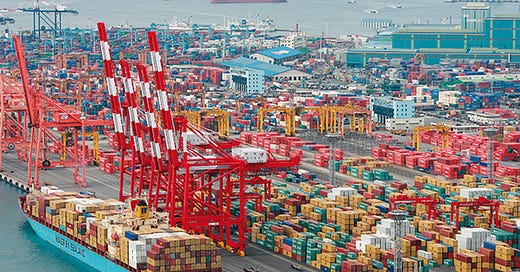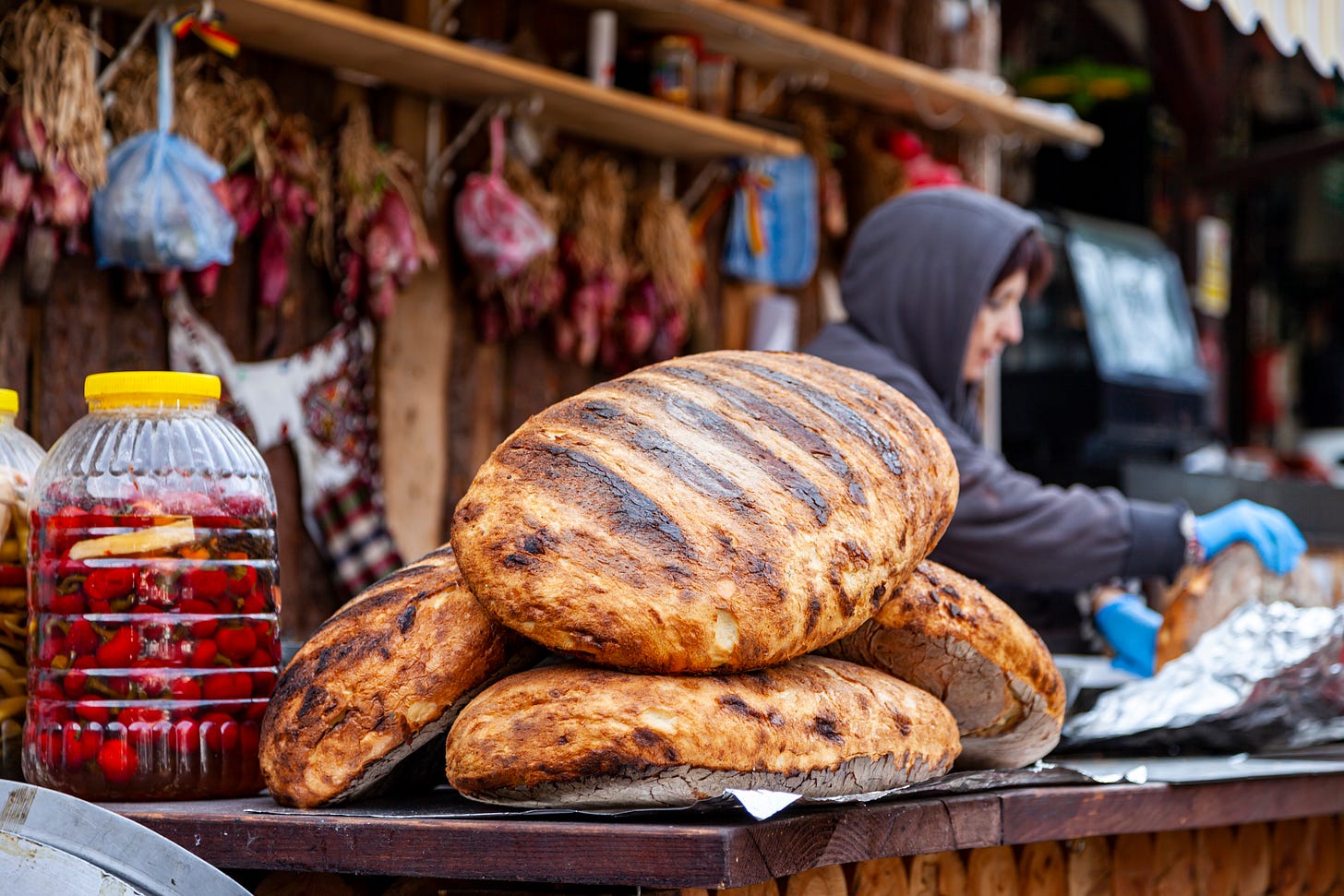Emerging Markets Daily - March 29
Shanghai Lockdown Hits Supply Chains, Russia Ties Drag on China Stocks, Food Prices and Eating Patterns, EM Assets Rise, Kenya Airways Stops Bleeding
Maersk Says Shanghai Lockdown Will Further Ensnare Supply Chains
Reuters
“Danish shipper Maersk said the Shanghai lockdown will severely hurt trucking services and increase transport costs, as China's intensifying efforts to fight the spread of COVID-19 further rattles global supply chains.”
“The Chinese coastal city, home to some of the world's busiest sea and airports, began locking down half of the city on Monday and intends to do the same to the other half for four days starting Friday in a two-stage testing exercise.”
“While it has kept its airports and deepwater port open, it has imposed stringent movement curbs, barring unapproved vehicles from streets and telling millions of people not to leave their homes.”
"‘Trucking service in and out (of) Shanghai will be severely impacted by 30% due to a full lockdown on Shanghai's Pudong and Puxi areas in turn until 5th April,’ Maersk, the world's second-largest container shipping company, said in an advisory to clients on Monday.”
“SEKO Logistics, a U.S.-based freight transport and warehousing company, said factories in the neighbouring province of Zhejiang were opting to move cargo out of Ningbo's port, rather than Shanghai. ‘We are anticipating: a sharp increase in air freight rates from today. We have already received some sky-high offers for enquires to Europe so far today,’ it said on its website.” Reuters reports.
Chinese Stocks Are ‘Cheap’ After Sell-Off, But Russia Ties Complicate Future
South China Morning Post
“Chinese stocks are on ‘cheap sale’ after a US$2.4 trillion sell-off in both onshore and offshore markets since Russia invaded Ukraine. What investors cannot price, however, is the risk of sanctions on China’s biggest companies.”
“As a result, investors should favour markets that are least exposed to the secular US geopolitical conflict with Russia and China, according to strategists at BCA Research. The risk premium-compression trade, touted by strategists at Goldman Sachs, can possibly wait.”
“China has refused to condemn Russia’s military aggression in Ukraine, while also publicly opposing the mounting Western sanctions on the Kremlin. That stance has presented a dilemma for Chinese firms operating in Russia, including Xiaomi, Sinopec and Alibaba Group Holding, the owner of this newspaper.”
“‘Chinese cooperation with other US rivals will provide more occasions for the US to punish China,’ BCA strategists said in a note on March 28. “Since China will help Russia bypass sanctions, US sanctions on China are likely this year, sooner or later.’”
“Foreign investors pulled almost US$10.7 billion from the Chinese stock markets in the first half of this month, according to Jefferies, one of the worst drawdowns on record by the Stock Connect’s northbound investors. The capital outflow suggests global funds may see the market as a valuation trap.” SCMP reports.
Soaring Food Prices Are Changing the Way People Eat
Bloomberg
“In India, roadside restaurateurs are halving their palm oil use and moving into steamed snacks. Bakers in Ivory Coast want to cut the size of their standard baguette. Sandwiches from U.S. fast-food stalls are headed for fewer slices of bacon, pizzas for a more parsimonious sprinkle of pepperoni.”
“With the world economy already shackled by Covid-related shortages and now reeling from Russia’s invasion of Ukraine, prices of such basics as bread, meat and cooking oils have jumped across the world, sending shock waves through the commodity markets and damaging the global food system.”
“For the most vulnerable societies—think Yemen, which imports 90% of its food in the midst of a grinding conflict and depreciating currency—this poses a genuine risk of hunger. Elsewhere, it triggers worries about what economists call demand destruction, a phenomenon when goods get too pricey to purchase.”
“…The attack on Ukraine further roiled global crop trading and sent prices of the two most common oils, palm and soybean, to records. Governments are starting to step in, curbing exports, controlling prices and coming down hard on hoarders. But as higher costs seep through to grocery bills and with festivals in Asia fast approaching, consumers are being forced to scale back.” Bloomberg reports.
EM Assets Rise With Eye on Ukraine Peace Talks, Chile Rate Move
Reuters
“Emerging market stocks and currencies pushed higher on Tuesday as investors found some encouragement in peace talks between Russia and Ukraine, while Chile's peso rose ahead of an expected interest rate rise by its central bank.”
“Latin American currencies firmed along with most other major emerging market units as Russian and Ukrainian negotiators met for direct talks for the first time in nearly three weeks. Ukraine proposed adopting neutral status in exchange for security guarantees, meaning it would not join military alliances or host foreign military bases.”
“The Russian rouble hit a one-month high against the dollar, rising more than 6% to a session high of 83.90, while stocks regained some ground in the fourth session since trading resumed after a near month-long suspension. Russia said it was launching a buyback offer on its $2 billion sovereign Eurobonds maturing on April 4, its biggest debt payment of the year, and would make full payment to bondholders taking up the offer in roubles.”
“This comes after unprecedented Western sanctions called Russia's ability to service foreign currency debt into question. The sanctions have sparked a rally in commodity and raw material prices, benefiting exporter-heavy south and central American nations. The MSCI's index for Latin American currencies has gained 7.2% in March and is on track for its biggest monthly percentage gain since June 2016.” Shreyashi Sanyal reports.
Kenya Airways Stops the Bleeding, Losses Cut in Half
The Standard (Kenya)
“Kenya Airways has cut its losses by half, reporting a loss before tax of Sh15.88 billion for the year ending December 2021, from Sh36.22 billion in 2020. Allan Kilavuka, the Chief Executive Officer of KQ, attributes the improved results to cost-saving in 2021 after it renegotiated terms of lease of aircraft that saw KQ pay lower lease fees.”
“There was also increased revenues as the airline resumed more flights last year following the re-opening of different economies, and in turn more people travelling. Revenues for the airline increased to Sh70.2 billion in 2021, up from Sh50 billion.”
“The revenues are, however, shy of the pre-Covid-19 levels, where the airline reported Sh128 billion in the year ending December 2019. ‘We negotiated with some of the aircraft lessors, and this resulted in significant savings in terms of the aircraft rentals, converting what has been a fixed cost into a variable cost,’ said Kilavuka.” The Standard reports.
“We cannot solve problems with the kind of thinking we employed when we came up with them.” — Albert Einstein





